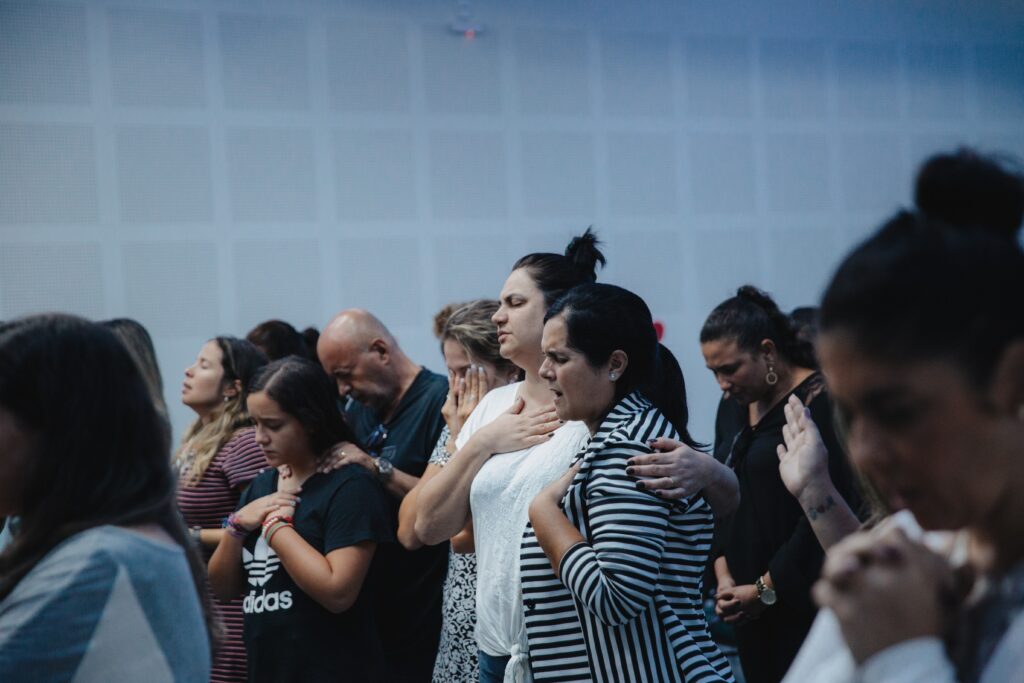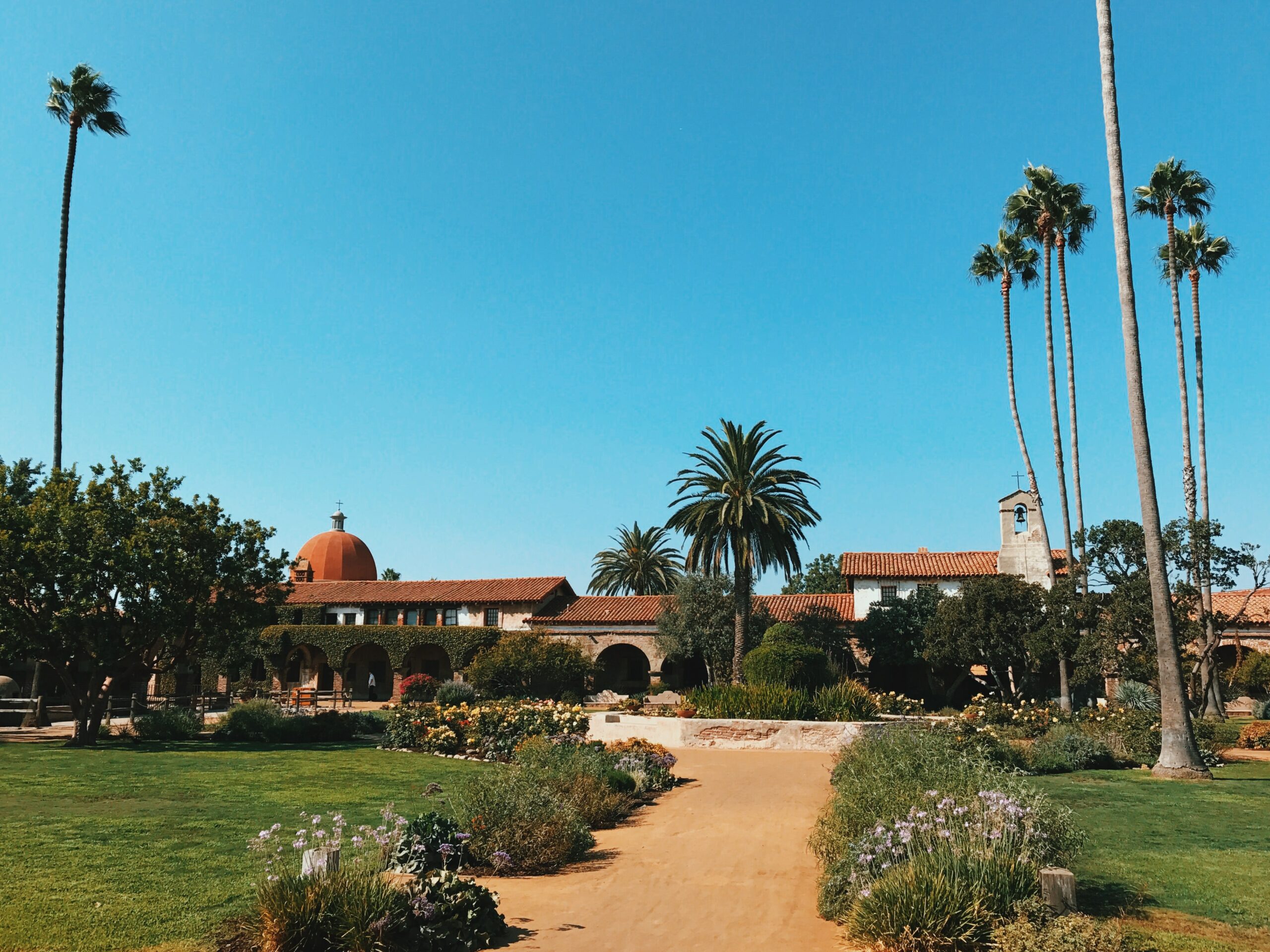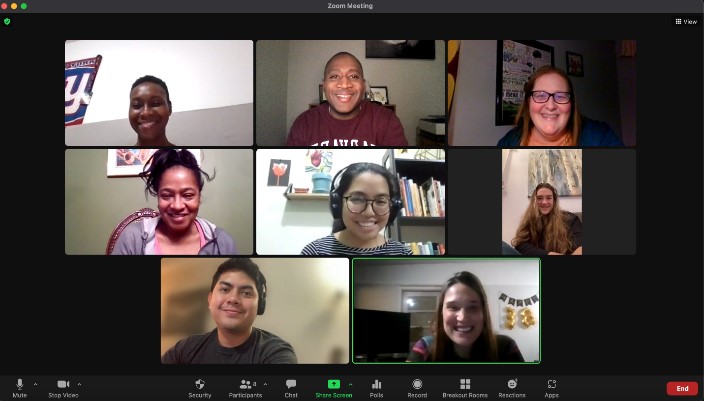Love Avenue: Relational Evangelism w/ Brenda Asare Akoto
Welcome to the GC Podcast, a podcast to help you develop into the healthiest ministry leader you can be by sharing practical ministry experience. Here are your hosts, Cara Garrity and Sarah Rossi.
Cara: Hello friends, and welcome to another episode of GC Podcast. Sarah, how are you doing today?
Sarah: I’m doing really well. How are you doing Cara?
Cara: Oh, I am doing great. This month is a great month. It’s my birthday month. So how could you be any better?
Sarah: Oh, I almost forgot about that. Whoops.
Cara: Ah, wow. What a good friend.
Sarah: I’m the best friend.
Cara: Oh wow. We all fumble sometimes in friendship, but now you know, and so now you can celebrate me.
Sarah: Yeah!
Cara: Speaking of friendship, today’s episode focuses on redefining evangelism through relationship. Sarah in your perspective, why might that be important?
Sarah: Well, I really think that relationships are the only way to do evangelism. And there is a quote that actually has been incorrectly, attribute it to Francis of Assisi, but I still think it’s great and still really like it.
And it says, “Preach the gospel at all times; use words only when necessary.” And so, this suggests that it doesn’t matter what we say, if we don’t “walk the walk,” no one will care about our “talk.” And they will probably also not want to keep walking with us. But I also think it’s important to redefine what we mean by relationship.
Relationship can be hosting game nights or going out to coffee to get to know each other, but it can also be so much more than that. If someone you’re friends with lets you know that their family is financially struggling, relationship means that you help them, no strings attached. And if someone has a different life experience than you, relationship means knowing how to genuinely listen to them, even if it makes you uncomfortable.
And relationship means you asking the other person, how can I support you, instead of assuming that what they need. There is a lot of unlearning that needs to be done regarding relationships, and we really need this unlearning and relearning to be able to form genuine relationships.
Cara: That’s a good word about redefining, unlearning, and relearning what relationships can look like. Thank you, Sarah.
Our podcast guest today, Brenda Asare Akoto, has some wonderful insights to share with us as well. Let’s listen to her interview.
Hello, friends and welcome to the latest episode of GC Podcast. This podcast is devoted to exploring best ministry practices in the context of Grace Communion International churches. I’m your host, Cara Garrity.
Today I am blessed to interview Brenda Asare Akoto. Brenda, along with her husband, Leslie, is a camp director and national youth pastor of Ghana. They also run a travel and tour company in Ghana and have three wonderful children.
Brenda, thank you for spending your time with us today. We’ll be exploring what it looks like to approach evangelism through a relational perspective.
Before we get started, would you share with us something that inspires you to worship?
Brenda: Thank you so much, Cara, for having me on. This is exciting to be talking to you all the way from Ghana. So, hello everyone, for everyone that’s listening. What was the question again? Sorry.
Cara: Yes. Share with our listeners something that inspires you to worship.
Brenda: I think, well not, I think. The only thing that inspires me to worship God is my life. I mean, I know definitely that my life is not mine; it’s in his hands. His love for me is so great that he died for me and gave me this beautiful life that I’m now living in him. So, obviously the inspiration comes from him, the life that he’s given me, the newness of the new life that he’s making me to live so I can walk in him. I can show the world who he is, I can talk about him. I can live him when I make mistakes. I know I have a father who I can run to. It’s just so soothing. So that is my inspiration. That’s what keeps me going every day, knowing fully well that no matter what I go through, my life is in his hands.
He’s in control of who I am and what I am. And as long as I stay with him, I can never go wrong because his faith is always faithful. Even if I am unfaithful, he will always be faithful. His love is eternal. Even if, sometimes I fall out of love due to my own earthly challenges, his love is always there because he is love.
He can be nothing else, but love. So my life, he in me, inspires me to go on every day to just worship him and talk about him to as many people as I can.
Cara: Amen. Well, thank you for sharing that with us. It’s a great way to get us started. And so, I’d love to jump on in; I think we’ll have a rich conversation discussing evangelism from a relational perspective.
So, can you just share with us what relational evangelism means to you and what makes relationships so important to sharing the good news because of Jesus?
Brenda: If you take it off from your last question about what inspires me, right from the beginning of creation, you could see that God really wants to have a relationship with man.
And he did that by creating us. And even though we fell away, he still found a way to redeem us back to him by sending our Lord Jesus Christ to come die for us. So, our relationship with God is so important! It is really important. It’s something that he cherished so much that he sent his son to die for us.
And so, for me, sharing, talking to people about him or trying to let the world know about him, starts from having a relationship with them. Because the same way, if we take the example from Jesus Christ, he didn’t just come and say, know God.
He came and he wanted to have a relationship with the kids. He wanted to have a relationship with those who are lost. He wanted to have a relationship with his disciples. He would come to you, talk to you at your level, what you know, where you’re from, and then he will build you up from there.
That’s how important relationship is to our Lord Jesus Christ and that was the example he gave to us. And so, for me as well, when you’re doing evangelism, that is in fact, I think that’s the foundation. Because if you don’t have a relationship with a person you’re evangelizing to, what happens is the person either doesn’t take you serious or doesn’t trust you, or there are just issues, so it’s extremely important to try and build an intentional relationship with whoever it is you want to go and evangelize to. And that would usually form a good platform to start off. And that’s why it’s so important, that’s why relationships are so important.
It’s good to make that conscious effort to have an intentional relationship with whoever you’re talking to, because that builds trust, that builds them being able to want to open up to talk to you. And if you don’t know what the issues are, how can you be guided by the Holy Spirit, of course, to be able to lead them in the right way to Christ.
So, I think it’s extremely important to build on a relationship when you’re talking about evangelism.
Cara: Amen. And I love what you say about it being foundational and that God so values his relationship to us. Right? And that’s part of the good news is that he wants to be in relationship to us. And so of course, would that not be part of the context in which we bring that good news? Oh, amen, amen.
Brenda: It’s beautiful when we get to a place where – there’s no other place where you can find someone who is there for you 24/7, who doesn’t care about your past, doesn’t care about who you are, where you’ve been, what you’ve done, just come as I am, come as you are. And he’s ready. His arms are always open.
If you look at the story of the prodigal son and him going away and the father is there waiting. Because it means he was waiting for that relationship with his son. He yearned for that relationship. So, all those times when the son was gone, when he was coming back, his father was waiting and ran to him, even before he got to the door.
That’s to show the extent of the love and the relational relationship that God wants to have with us. It is really an intentional relationship. Like I said before, for him to send his son to come and die for us, when we understand that (especially when we know that he’s the king of Kings, I mean, all he needs to do is speak and things come into being), it’s a beautiful thing to have a father like that.
Cara: Yes. Amen. And to build those kinds of intentional relationships with one another is a reflection of him. As you said, Jesus could have just shouted to us the good news, but instead he dwelt among us. He came to be with his people, and so, that’s a way that we get to reflect and participate in his life. So, I thank you. I love thinking about our relationships with one another being grounded in his desire for a relationship with us.
I do think that one of the ways that the evangelism that I’ve experienced can kind of go awry sometimes is by creating this kind of “us versus them” mentality. How can relational evangelism kind of break down the walls of “us versus them?” Those of us who are Christians and those of us who aren’t, or maybe those who get it and those who [don’t]. How can relational evangelism kind of break down those dividing walls?
Brenda: The Bible says in Romans 3:23, that we all have sinned and fallen short of the glory of God. He didn’t say, for some have sinned. He said, all, every single one of us. And our life, it’s not ours anymore. The day we decide to let go of the world and now go into a relationship with Christ by dying and getting baptized, he says, we lay down our lives even as we die during baptism.
So, if we don’t learn to die, not just – yes, we do it during baptism as a symbol, as a symbol of us dying to the flesh and waking up into the spirit – but if we don’t learn to die, even in our attitudes. When I talk to some of my youth, I say, our flesh, we’re too alive. We are too alive. We need to die. Because the truth is, if we don’t die, what we will see is we’ll think we are more superior; we will think we’re better. We’ll think, oh, we have so much. We’re so blessed, and the others are not. And if you take that attitude, like you said, to evangelism, the people can feel it. They can feel it. Sometimes you don’t even have to say it. It doesn’t have to be words. It could just be in your actions.
It could be the way you look. It could be the way you express yourself. And so if we, as Christians, don’t learn to actually die to the flesh, die to the things of pride, thinking oh, it’s our intellect, it’s what we are, it’s where we are, those are the things that make us who we are and not understand the true meaning of grace.
Understanding that even the fact that we can all breathe air is by grace. The fact that we can even wake up in the morning and see, is by grace. People had plans for today, the 11th of November. They had plans for today, but they woke up today and either they’re gone or they’re sick or they’re in hospital, or they’re knocked down or something happened.
So, the fact that we are alive today is not because of our intellect or education or things we know. It is just his grace, his mercy is upon our lives. And so, if we have that attitude, the attitude of knowing that our life is through him, by him, and for him, then we will not have that mentality of “you versus us.”
And so that wouldn’t come across in my evangelism, but I think one of the ways that we can sort of break down that wall, like I said, it’s understanding that we are not of our own, the things we achieve is not due to our own capacity.
Let me give you an example.
We do evangelism in my local church and most of the times we go (where we go for evangelism) about two or three months regularly. We do it sometimes on Saturdays. About two months ago, we went for evangelism and just as we were leaving (we went with some friends of ours) and just as we’re leaving the church grounds (we have like five or six churches just on our street corner alone) and so one of the friends who came with us, through one fellowship, came and said, “Oh, you have so many churches here. You shouldn’t have any issues here.” And I just said, “Oh, I wish that was the case.” And we just turned a corner on the church and just behind us was a group of young boys and children who were living in slums and dilapidated places.
And there were in my group of four, there were five. I just thought, let’s split ourselves. So we split and I handled one young man named Kelly, and I was asking him what he’s doing, where he is. At a point, I said, can we sit down? We sat somewhere and we just talked and I wasn’t talking to him about, “Oh, you’re a sinner. The job you’re doing is wrong. You have dreads, having dreads is wrong. You have tattoos.”
I wasn’t talking to him about those things. It was just, tell me about yourself. Tell me about your family. Tell me about your life. Tell me about who you are. Tell me why you’re here. You’re 21. You’re living in Islam. Your parents are not even in this country. Why are you here?
So, it was more of, let me know you, and I was also opening up. I was also telling him who I am. Apparently, we’re from the same country as well. And we got to talking. So, we first clicked on that level. The level of, okay, she wants to know me; I want to know her.
And then we moved on to the good news and which is all we should really share where we go for evangelism. It’s not “you’re a sinner message” we’re sharing when you go for evangelism. It is the good news about Christ, who he is, what he came to do, how he saved us, what he did, how much he loves us.
A lot of times you find people who are lost, who are in such situations, are really just yearning for love. They’re just yearning for someone to care about them. They just yearning for someone to be intentional about how they treat them, how they walk with them. So anyway, long story short, we talked for a while. We prayed at the end of the evangelism, and then he promised that he was going to come to church the next day. And I took his number. Now, this is where it gets interesting. I just told him the name of the church. I didn’t say Grace Communion. I think I said Grace Communion, GCI. That’s what I said. And then the next day, when we went to church, the phone number where he wrote the phone number, I gave it to one of the other girls and she hadn’t come to church. And I was like, oh shoot. I was supposed to call this boy so he could come to church.
Midway through the service, I was doing announcement and this young man walks into church. This is someone who hasn’t been to church for – what he said, he hadn’t been to church for years and he’s just 21. And I said, “How did you find, I didn’t even…?”
He said, well, after we spoke, he couldn’t sleep. And he said, okay, he remembers, I said GCI. And then he just kept on asking, where’s the new church that just came in, where is the new church just came in. And that was how he came to church. And now he comes to church with us.
So, it’s when we make them feel loved. We make them feel at home. We recognize that we are all saved by grace. We don’t accuse them. Instead, we preach the good news. What happens is they feel like, yes, this person really cares. And that’s what we feel with Christ. We feel that Christ genuinely loves us. Love is not – yes, it’s a feeling but it’s more than action. The Bible says that for God so loved the world that he gave. Gave, given is an action word.
He did something because he loved us. And so that’s how it should be with us as well. So we should be intentional about giving love to these people and not trying to condemn, or create, like you said, the “we versus them” mentality. Okay, I think I’m going to stop now.
Cara: No, that’s wonderful. Thank you for sharing that story and example, because I think that it brings to life for us that it is about relationship. It’s about sharing life with people the way that Jesus shared life with people. It’s not just about going in trying to convince people of something but coming alongside and experiencing the love of Christ with people. And that’s a beautiful thing. It’s a beautiful thing. Thank you.
And, as you shared that, I think about in the Love Avenue (the ministries of the Love Avenue, making friends, building those relationships), it is one of the key practices of the Love Avenue. So, to you, Brenda, what are some of the things that you believe characterize deep Christ-centered friendship?
Brenda: For me, one of the things that really bring Christ to life, especially what we’re talking about in the area of having Christ-centered friendship, the first thing is accepting everyone as they are. Accepting people’s flaws and then helping them, not commanding them, not dictating to them, letting them know, first of all, that we care. Like I said before, Christ cares and we know it. We feel it, we see it, we experience his care. We experience his love. So, for us to have that Christ-centered friendships, we need to accept people. Christ accepted everyone, everyone to the point, even to tax collectors, to prostitutes, he accepted them.
And he said, I have come for the lost. Not for those who think of them highly of themselves. So, I think for us to have that Christ-centered friendship is for us to actually look at how Christ first loved us, how he first showed us how to love. So, accepting everyone, let’s build trusting friendships because that’s really important.
We trust God, no matter what we’re going through. We know God loves us. So, we trust him. And that’s one thing we can pass on to whoever we’re dealing with, be it in our schools, in our communities, in our offices. Let people trust our friendship, let them trust our words. Let them trust our integrity. Let them trust our humility.
Let them trust our servant-leadership attitude. Once trust is established in a relationship, what happens is people say, “Oh, you know what, Cara? Oh, I know she wouldn’t do that.” That way you’re building Christ-centered relationships.
And I think another thing that happens is obviously we’re all human, so we’re bound to make mistakes. Just like we make mistakes before God. If you look at the Lord’s Prayer, he says, forgive us, our trespasses, as we forgive those who trespass against us. So, everyone, we all make mistakes. Even though we’re living with a righteousness, conscious attitude, not a sinner conscious attitude, we still know we make mistakes.
Well, thank God for the righteousness of Christ. And so, when other people make mistakes like that, we need to correct them in love. We shouldn’t correct them with, like we said before a “we versus them” mentality, we should encourage them, not, “Oh, you’re so bad. You’ve gone wrong. This is way too much.”
Sometimes we think sin has degrees. We have the black sins and the white sins, or the white lies, the black lies. Before God, sin is sin. And so just as we sometimes fall short, same way other people will fall short. So, we need to correct everyone in love. We shouldn’t be judgmental, not be the ones to cast the first finger. Just like Christ said, he who has no sin should be the one to cast the first stone. So, we’ve all sinned.
And then of course we should listen. Listening, I’ve found (especially in our ministry, the youth ministry) is one way that I found that’s been able to help us to be able to work with the youth. Sometimes the kind of stories our youths tell us, sometimes they haven’t even told their closest family and their closest friends. But because they know they have a listening ear and an ear they can trust, you find sometimes they literally tell you their life stories, and we’re able to work with them.
So, for me, I think just exhibiting the fruits of the spirit, exhibiting those things (the love, the patience, the long suffering, all those things), those are the things that will really make Christ come alive, in any relationship or any friendship that you have that needs to be Christ-centered.
So, so I think for me, those will be the things, off the top of my head, what would make people have Christ-centered, meaningful friendships, friendships that lasts beyond emotions and situations and circumstances, friendship that lasts.
Yes, this person is indeed my sister. I mean, I should be able to say if I’m with you, Cara, in my Christian walk, I should be able to say, “You know what? Cara is my sister.” And it’s not about whether I am happy or sad, but I know she’s my sister because she’s proven it. We’ve experienced a relationship that goes beyond what the world calls friendship. So, I think those are the things that would for me, would relate to having deep Christ-centered friendships.
Cara: Yeah, that’s good. These kinds of friendships that are built around Christlikeness and ways that that honor who he is. And even in the way that you described that, Brenda, it sounds like to me that these are the kinds of friendships that can be built with those who don’t follow Christ already. Which I think is important to note (especially as we talk about relational evangelism) that Christ-centered friendships can be built, as you’ve mentioned, with those in your community, in your neighborhood. It’s not restricted to those maybe who are already part of the gathering church community.
We can honor Christ with our relationships wherever we build relationships. And I think that that is a beautiful thing, in the way that you described, that I think can free us to think about: how do we honor Christ in all of our friendships, not just with those who are already Christ followers as well?
Brenda: Yeah, actually, there’s a saying (I don’t know, I’m not sure where this was said), where they say, “You might be the only Bible that someone’s read.” And that is because you are not walking of your own. You’re walking as a child of God, as an ambassador of Christ.
And so sometimes you get to a place where no one knows you, but your attitude to be able to tell people that, that is a child of God. And so, you “being the Bible that somebody reads” means that the person has, maybe someone has said it, or maybe he’s jumped on a Bible somewhere. He’s heard it somewhere. And he sees that living in you, even with the way you talk, your walk, your attitude.
So, it’s not just for those of us in the church, it’s also for those who are actually out. Actually, I think it’s even more important for those who are outside the church. Because if we remember in the book of Acts, the first time the disciples were ever called Christians was because they were acting like Christ and that’s how it should be with us as well.
It should be with us that when we go out, our Christ-ness (I don’t know if there’s a word like that) but that we’re Christ-centered should be so evident. The Bible says our lives should so shine that the world will know. So that’s how it should be for us. So, it’s not just, like you’re talking about, inclusive evangelism for people who are not in the church, our attitude should be the only Bible, the first Bible that someone has read. And that’s what they should see while we go out for Christ.
Cara: Yes, I like that. That’s good.
Well, speaking of that (this is in a similar spirit), when we see the person of Jesus, in Jesus, God does come to live among humans as one of us, right? So, there is something incredible that we learn from Jesus about living among the people and not going into the community just only on, quick, maybe one-off excursions just to get people to come to church. What can it look like for the church to truly live among the people as Jesus did, to build these meaningful relationships, to have a steady presence in the congregation’s neighborhood?
What does that look like?
Brenda: What does it look like? I think it will look glorious!
But you know what? Until the church – until we learn to start (I’m trying to think of the best way to put it) until the church learns that we are part of the people. So, the Bible tells us that we are in the world, but not of the world. We are in the world. We are here at this moment. It’s God’s will that we are alive 11th, November 2021.
It is his will that we are here, and there is a purpose. There’s a mission. There’s a reason why we are alive today. And if we look at the story of Jesus, his whole purpose was the kingdom of God is here. The kingdom of God is coming. And the kingdom of God is like this. The kingdom of God is like that. The kingdom…everything he was doing was just focusing on bringing the kingdom of heaven to earth. And that is exactly what ours should be as well.
So, until the church begins to learn that we are part of this world, we are not of this world, because – I usually give an analogy. Say for example, (I’m in Ghana) the President says, “Okay Brenda, go be an ambassador of Ghana in Australia,” for example.
When I get to Australia, I am no longer Brenda. I am walking in the capacity of the President of Ghana. And so, what that means is whatever I do should represent Ghana. Even if I am in Australia, whatever I do, I should represent Ghana. I should breathe Ghana. I should eat Ghana. I should talk about Ghana. I should, everything I do should be about Ghana.
And that’s exactly the same thing with us. So we are in the world, but we are not of this world. And so, it’s extremely important for churches to begin to go out and try to find activities, try to initiate activities that will be an inclusive activity that involves the community they’re around.
I remember when pastor Kalengule Kaoma – there’s one saying, he said that I heard, and I’ve never forgotten it. And he said, “If your church, if they were to take your church out of that community, would the community miss you?”
And that statement has stuck with me since I heard it. Will the community miss us if they take us out of that community? Will my office miss me if I am taken out of my office? Will my business, the people I work with, would they miss me? Would I have represented something? Would I have done something? Would I have shown something if I was to be taken out of that community?
And so that’s how it should be. Until we begin to initiate activities that will bring the community around us to be able to experience the love of Christ, it still will not have that glorious look that we’re looking for. We will not have that look that we’re saying, “No, you know what? God is here,” because if we have to be able to, like I said, initiate those activities so that they can now be part of us so they can understand who Christ is.
If we don’t go to them, who is going to preach the gospel? If we keep secluding ourselves or taking away ourselves from the community, who is going to let them know about the word of God? I mean, if the apostles, if they didn’t move from where they were, the Gentiles, nobody would know about [the gospel.] If they didn’t, if they were not ready to go out and talk about Christ, we wouldn’t have the gospel today.
And so, our generation needs to learn to look for ways to get involved. I mean, there are so many activities that the neighborhoods come up with. Let’s get involved! Let’s get involved and be the difference. Let’s show them what the difference looks like, and not stay in our corner and expect the community to change, while we are in our corner and they’re in their corner. No, it doesn’t work that way.
So, we need to initiate. We need to initiate activities. I know one of our local churches here in our Ashongman branch, what they do is, the children (this is actually done by the children, as in the Y.E.S. ministry) what they do is they go out and invite other children around the community and they are constant with it. So, they do this constantly. And as they do that, because they now have – you know how children are! They talk to other people, other children, and then the children come to church. They play with them. They have games, they talk with them, they teach them about Christ. The children go home.
By the next week, these children leave their parents and they come to church. And so, if you come to the Ashongman congregation now, we have a children’s ministry that’s flourishing, flourishing with children whose parents are not even in the church, because the children of Ashongman branch actually went out. And it wasn’t a one-off thing; it was a constant thing they kept on doing.
And now we have a vibrant children’s ministry. And we pray that even as those children are being taught the good news of our Christ, when they go home, they would make a difference in their home, that their parents will want to find out: why is my child so much better? What is it about my child that is making him, now a lot better than how he was or how she was? Why? Because she’s experienced the love of Christ.
So, for me, the church, we need to learn to go out more, we need to go out more and create situations where we can just invite people of the community. I mean, Christmas is coming! There’s so much we can do. We can do singalongs at our community. We can do whatever, just something constant that we’re constantly in their face with love. And we can therefore show the love of Christ to the community.
Cara: Yes. And I love what you said about Jesus’ ministry. His earthly ministry was “the kingdom is at hand, and the kingdom is like this, and here’s the kingdom.” And that the church’s ministry is to be like that too.
And then for the church to understand that we are a part of the people and not to be living separately, but to be creating these spaces to say, “The kingdom is at hand and the kingdom is like this.” And to create those spaces to experience that, I think that that’s incredible. Like you said, that’s not going to happen if we are to just sit in our separate corner. Or to just do one-off things, because going back to what you were saying even about relationship as foundational to evangelism, there won’t be trust.
And that’s not even the proper context, right? That wasn’t Jesus’ context to share the good news to just one time a year go into the community and say, well, “Hey, come to this church. We’ve got some good news.” Who are you? Why should I come to listen to this?
Brenda: Exactly. I’ll come to you only on the holy days. And then after that, I’ll let you go.
I listened to (I don’t know if you’ve heard of him) Myles Monroe before died and there was this message. He was talking about how we, Christians, we need to learn to stop running away from positions of leadership and the media and things like that. Because if we don’t do that, what happens is those positions are being filled by people who may not necessarily be Christians. And so, what would happen is you see networks showing things that are not Christian for our Christian children.
But if we sort of try to get in those places, what happens is then we, ourselves, we’re able to influence, even in our own little corner, what is being done or what has been said, or what has been shown to people. So, I think it’s really important for Christians to rise up and begin to get involved.
Cara: Yes. And to be ambassadors, as you said, be those ambassadors. Yeah. Creating those tastes of the kingdom, wherever we go. That’s good.
And so how can we continue? Because there are a number of different ways that we can, and the church historically has thought about evangelism. So how can we continue to develop the church and our churches locally and our members to think about evangelism relationally?
Brenda: Well, speak on it. Keep talking, keep talking. That’s the first and basic thing I think we have to do; we have to keep talking about it. We need to sensitize people’s consciousness. The more you hear something, the more (that’s why we need to be careful what we put in us, even as Christians) because the more you hear something, the more you listen to something that thing becomes what is innate in you. It becomes part of you, becomes your subconscious.
That’s why Joshua tells us, “Day and night, I will read the Bible. And I will study his word day and night,” because the more we study the word of God, the better we are, as children of God.
So, I think the first thing is for us to constantly speak about it, constantly talk about. Create intentional activities, sensitizing our congregation. Put deadlines. Say, every three months, let’s look for something that we can do. Every six weeks, let’s look for something that we can do, and make it an intentional activity for the church. Make it an intentional activity for our local congregation.
And so, people’s minds begin to to accept, begin to understand the importance of this relational evangelism. Like I said, if you talk more about it, people hear it. And then they begin to work at it.
Set goals. Let’s set goals. Let’s set goals for these activities. Let’s create S.M.A.R.T. goals for our congregation to say, “Oh guys, this year we want to do at least XYZ number of relational – have relational evangelism and be able to have an inclusive evangelism that includes our community.”
And you find out the truth is, you find that when we begin to do these things, the local congregation, it will not just be around the church. They will start thinking, even in their offices, they’ll be thinking, “Oh, how do I do this? Even here? How do I get people around me here to know about Christ?”
So, it’s something we need to continue to speak about. We need to speak about. And even in the process, there are times where we’ll do activities that might make mistakes, but even in our mistakes, we learn.
So, we learn from our mistakes, and we celebrate our successes, even in doing this and now we know what to do and what not to do. But the basic thing is just talk about it, sensitize people about it. We’ve seen movements being created all because of talk. Use social media, if it needs to be, if it’s relevant to your congregation.
Use the youth, they are very vibrant. They’re ready to go to Timbuktu for you, for what they believe in. So, let’s put it on our Whatsapp platforms and our local congressional platforms and our Zoom platforms. Let’s talk about it where we do Bible study, make it something that we talk about, we share. Let people talk about their experiences.
The more we do this – and let’s not make it a one congregation thing. So, if say Ghana is going to do it, for example, let it be something that the whole of Ghana is aware of, not just one congregation. So that in all the congregations, all of the communities where we have GCI Ghana congregations, we’re all talking about the same thing, we’re all doing the same thing. And around the community, they all know, they can all see, now these people really are different. They really love God. And they really want to share about Christ. They really want to talk about Christ. And before you know it, things happen.
I mean, during COVID, there were so many things that the church had to learn to start doing, relational evangelism stuff, that the church had to start doing, because now you’re stuck in your homes, you have your community around you. What do you do?
So, during COVID we all had to get out. We all had to reevaluate our local community and say, “Okay, how can we reach out?” It’s not just where we are in terms of the placement or the location of our local church. It’s also where we live, it’s also our offices, it’s also our schools.
Christ’s message needs to go out. It needs to go out and we have to be ready to share it. Share it to the world, let the world know who it is and how proud we are to have him as a father, a savior, and a Lord and master. So, we just need to keep talking and make S.M.A.R.T. goals so that the church is sensitized and they’re aware that that’s where we’re headed.
Cara: Yes. I think that, as you say, as we talk about it, then we’re thoughtful, we’re intentional. And in community, together as the church, we’re participating in what God is doing in our midst. And we’re discerning, how is he inviting us to participate in his ministry, in sharing his good news.
I love what you say about making those goals, because I think that that’s those two things together: talking about it and learning, discussing intentionally how we want to participate and think about ministry and then also doing. Connecting our thinking with our participation is important! Because we can sit around a table and talk all day, but then something about the actually participating physically in how we are discerning God inviting us to participate in his ministry is important. And as you said, we will make mistakes, but together we’ll learn and we’ll grow, and God will continue to teach us in that. I think that as we do that, we continue to be transformed. We continue to grow and learn and become more excited about this way of sharing his good news.
I think that that’s a great way to think. And then, like you said, corporately as well as personally, there may be things that we do collectively as a church, but then it also transforms the way that we exist in the world, even in our personal spaces, like work or school or things like that.
Yeah. That’s good. It’s a transformation.
Brenda: That’s very true.
Cara: Are there challenges or joys that you’ve experienced as you have built these relationships in your community that you’d like to share with our listeners?
Brenda: Ay, ay, ay! Okay. So, we used to do what is called the youth retreat in Ghana. And we actually got this idea from Anthony Mullins and his wife when we came for the GCI convention. I think it was in 2017.
We came back and we got an idea to just go around the whole of Ghana with the youth to have youth retreats. We would take youth from the south side of Ghana, and we would take them up to the Volta Region, or the different regions of Ghana, to just talk to them, about their local church, the challenges they were having, and also evangelize around the community.
And one of the first challenge we realized is we need to know our community. We need to know what our community likes, what is acceptable, what is unacceptable in that community. For us, there are some communities you can’t just walk in there and say, you want to do evangelism. There’re some communities where you need to go speak to some people who are the elders of the community and say, “Look, we want to just come and talk to you about, talk to your people about the love of Christ.” And they have to give us the say, the “yes” say. Some communities, you will go, you don’t have to do that.
But you have to also understand things like, what language they speak in those communities. Sometimes if we don’t have the right people who would actually share the word of Christ to them, what would happen is we’ll get to the marketplace and we’re speaking English and the people in that community, they don’t understand English. Or they would rather you speak to them in the local dialect, and we don’t have someone.
So, the first thing that I would say is know your community. Know what they are. Know their dislikes, know their likes, know what is acceptable. Know what they are prone to. Know what makes them who they are. We can then walk from that to knowing how to approach them with the word of Christ.
And I think we see that in Paul. Paul does that very well. If you looked all through his (I think 13 or 19) books that he wrote in the New Testament, you would see that that’s what he does. First, he’ll start talking to them from a point they are familiar with. So, he wants to talk to them about the love of Christ, well he will start telling them about the law of Moses and the law of what they already know. So, they start from a place that they are familiar with, and then he builds it on to say, look, now this is the fulfillment of the law.
And that’s what we should do too. Know our community. Know the people we’re going to talk to and then build up from there.
And then when we build up from there, we’ll also be able to know the right timing to go to those places. Because those are some of the challenges we were having as well. Sometimes the timings we will set to do any kind of community evangelism might not be right. So we would have to change some of the timings, things like that.
And then, like I said, get the right resources. Get the right resources that would help, that would be able to pass your message across. Get the right people. Get the right equipment and things like that.
And then you’ll find that a lot of the times, when those things are put in place, it still doesn’t mean the community is going to accept you. Because that’s one of the challenges in some of the places we went to, it didn’t mean the community was accepting us. Sometimes you would go, like I was talking about, the story of the young man we spoke to, in that same community, there were people we spoke to who told us, “Look, I’m not interested. I don’t want to hear about it.”
So, you would have rejections. And when you have things like that, don’t take it personal. Don’t take it personal at all. Take it like, okay, this is not the time for this person. Pray with him, if he lets you, if she lets you and then move on to someone else.
Because the truth is in his time, he makes all things beautiful, in his time. It’s not about my timing; it’s his time. Our job is to go and evangelize. It is the Holy Spirit that convicts. So, it’s his time. That is important. It’s not our time.
Those are some of the challenges that we’ve faced in ministry, in youth ministry, in terms of being able to walk with people in the community with our youth retreat ministry. And during as well, we’ve got some really great success stories, by the grace of God.
We found that even as we move out to evangelize to people, we’re actually building our youths as well, because what we do is, it’s not always us that’s speaking. Most of the time we allow the youth themselves speaks and you find out when they do this, they are then forced to study the word themselves. And then they’re forced to look into the Bible so that they know they’re saying the right thing. We go back and forth on their messages and things like that.
So, we find out that one of the joys we see, is our youth being built up in the word. And they are being fully grounded in the word, even as they go out and evangelize the word. And that’s how it is. The teacher, you need to also be fed.
And sometimes when you do these things and you listen to them, there’s a joy in your heart when you see these youth who some 1, 2, 3, 4 years ago, didn’t even want to know anything about Christ, but now they are very vocal about the love of Christ and they’re ready to speak. Sometimes when they speak, you begin to see the giftings of the word that comes out of them. And yeah, you’re identifying different talents that the Lord has placed in them that you can use during this thing.
You’re building the outside of the church and you’re also building the inside of the church as well. And that’s why I like the fact that the church is concentrating on us being a healthy church, not a church that is focused so much on numbers; we’re more focused on the quality of the church members as against quantity.
So, for me, those are the things, the challenges and some of the joys that we’ve experienced in building relationships within the communities that we go to during our youth retreats.
Cara: Thank you for sharing that. Thank you. As you’re learning through these joys and challenges, what advice do you have to share with our listeners as we all journey in living out evangelism as relationship?
Brenda: I think the first thing for me will be that we should be open-minded. Because what you find out is everyone has been through something.
Everyone has a journey that they’ve been through. If we want to actually live out an evangelistic lifestyle in our community, we need to be open-minded. We need to be open, to listen to people’s struggles, be willing to listen to people’s ideas.
We don’t think that we have autonomy to wisdom, we have autonomy to knowledge. In our ministry, we’ve learned that even some of the young Y.E.S. kids teach us things and literally, they would make a statement and it would just trigger something in us. So be open-minded to learn, be humble to know that, no, we don’t have all the knowledge. We can learn from each other. I learn from you; you learn from me. It’s not about if I’m in the church or out of the church.
There are times when you are talking to people who, and like I said before, all they just want to hear is, the love of Christ. They just want to hear that this person actually cares and loves me.
And so that’s the advice I would give. Be open-minded.
The next thing I would say is I remember 1 Corinthians 16:14, when he says that we should do everything, everything in love, that we should always act in love. So, when we’re going out like this, we should permeate the love of Christ.
Everything about us should be about the love of Christ. And that love is the agape, like we all know, the agape kind of love that keeps record of no wrong, that is patient, that is kind, that doesn’t envy. Doesn’t boast. It’s not arrogant. It’s not rude. It doesn’t insist, it’s my way or the highway.
It is the love that bears all things, believes all things, hopes all things, and endures all things. And when we begin to walk in love like that, you find that the community will be warmed up to us. They will see us as a people of love. And because we represent love, who is not attracted to love?
I mean, everybody wants to be loved. When we walk as children of love, the community is also open to us, to want to understand the kind of love that we have and be able to want to walk also in that love. For me, those would be the two things that has really helped: being open-minded and being open to show the love of Christ and walk in the love of Christ.
And that’s it. That that would be it for me in terms of what we need to do.
Cara: Well, that is really good advice, Brenda. So, thank you for sharing that. And as we start to wrap up our conversation today, is there anything else that we haven’t discussed or that I haven’t asked you, that you’d like to share?
Brenda: No, I don’t think so. I’m just really, like I said before, I’m really glad and happy that we’re looking at the direction that Dr. Greg has taken us, in terms of being open, being open to having a healthy church. So, we’re focusing, not just inside, but outside as well.
Because one of the challenges we found as well, is sometimes when we go out and we do this evangelism and people come into the church, they don’t actually see that atmosphere when we don’t have an organized or structure that makes them want to stay. Sometimes they come, a few times, and then they leave again. And then we have to go back again to try and get them back again. And it’s like, go back, go back, you’re going back and forth. So, I’m really glad with the direction where we’re not just focusing on the outside, which is a Love Avenue. But we also doing the Hope Avenue, and we’re moving even further to do the Faith Avenue, where we are interested in our people. We’re making sure that people that come stay, and we’re all growing together in the word.
For me, that is something that is so beautiful. And it’s very crucial, especially in the ministry that we’re in, because you find out even now, a lot of the youth, they want to go out. They don’t want to stay in the church. Why? Because the atmosphere that they need, the kind worship they would want to experience, they sort of think, okay, I’m not getting it here.
But thank God for this. A lot of the youth are staying in the church. A lot of the youth are beginning to open up. A lot of the youth are beginning to talk about being part of the church, the church’s growth. So, I’m really happy with that, the focus and the way we’re going. And I pray that the Lord will continue to give him more wisdom so he can come up with brilliant ideas like this again.
Cara: Amen. And that’s a good word, even on the interconnectedness of the three ministry Avenues.
So, I thank you, Brenda, for this really rich discussion. And I think that our listeners will have a lot to continue to pray about and to discuss with members and leaders locally.
As we prepare to end our episode for today, we love to have a little bit of fun on GC Podcasts. So, I have a few fun questions for you, and you can just answer with the first thing that comes to mind. So, no pressure, no pressure, but here we go.
Brenda, would you rather be forced to sing along or dance along to every single song you hear?
Brenda: Sing along. I love to sing.
Cara: Oh, okay. Do you prefer mountains or beaches?
Brenda: Beaches.
Cara: What is the best piece of advice you’ve ever been given
Brenda: Be yourself.
Cara: Oh, that’s a good one.
What’s your favorite game to play as a child?
Brenda: Oh, I don’t think you’d know that one.
Cara: That’s all right. You can share for our listeners anyhow.
Brenda: It’s a game we used to call Ten Ten. It’s played within two people. Sometimes you can line up a group of as many people as possible on one side and then on the other side. And you clap your hands, and you jump up. It’s called Ten Ten where I come from.
Cara: Okay, nice. Well, for our listeners who don’t know that game, they can Google it or ask a friend.
What is the place that you’ve always wanted to travel?
Brenda: I think now maybe Singapore now.
Cara: Oh, nice. Yeah. What is your favorite time of day?
Brenda: Ay, ay, ay. Favorite time of day? Hmm. I guess, early morning. Dawn.
Cara: Thank you. And the last question, what would the title of your autobiography?
Brenda: Oh my goodness. Ay, ay, ay! Oh, that’s a good one. Title of my autobiography? “I was here!”
I don’t know.
Cara: That’s a fun one. That was a tough question.
Well, Brenda, thank you so much for taking your time to join us today. It is our practice with GC Podcast to end our show with prayer. So, would you be willing to pray for our churches, pastors, and ministry leaders and members in GCI today?
Brenda: Yes, that’s fine. Let us pray.
Our Father in heaven, we thank you. We thank you so much for being the God that you are, being the God who never fails, the God who is always with us, the God who teaches us, who walks with us, who is intentional with your love for us. Father, we’re so grateful for today, we are thankful because we know that we’re not here by our power. We’re not here by our might. We’re here because of your grace and your mercy towards us.
And so, we’re thankful for this day, Father. We pray for our leaders of GCI. We pray for our pastors, our ministry leaders. We pray for the pastor’s wives. We pray for all those who are in a position to be servant leaders for our congregation, Father. We pray, oh God, for wisdom. We pray for knowledge. We pray for understanding in your word, oh God, so that they will be fully grounded in you, Father.
We pray for the wisdom to lead in the right way. Father, we pray that you will teach, you will guide, you will help, oh God. So that they will be able to have that wisdom to be able to walk with people that they work with, because we know Lord that it is not by power. It’s not by might.
We know that there are times as human beings, things will happen, oh God, that might make us want to derail from breaking the relationships that we have. But Father, we pray, Lord God, that they will walk in love. That your wisdom will lead every single one of them to walk in love. So, then they would walk in love with their congregation, and they will be able to get through everything together, as one people, bounded by your love. Father, we pray, oh God, not just for wisdom and knowledge and understanding. We also pray, oh God, even for the congregation, oh God, that you would help them also be able to know that it isn’t easy to be a leader. And so, they would also pray for them and be able to walk with them with understanding. Father, we pray to our King of glory, that you will guide and protect our homes.
Oh God, we know that if we’re away doing ministry, there are times when you are tired. You’re frustrated. You’re just, you’re spent, Father. So, we pray for strength, oh God. We pray for strength for our ministry leaders, that you will continue to give them the strength to carry on, to fight that good fight, even until the end, knowing fully well, that their reward is with you, Lord.
Father, we pray also for their families that you will bless them. You will guide them. You will protect them. You will help them to be able to be a pillar of support to the ministry leaders, oh God, so that they will be able to hold them up and they’ll be able to do the work, the ministry where you have placed them to the best of their ability, Father.
Most of all, we pray that the Holy Spirit will continue to guide them, oh God. Father, we do not want to speak of our own, oh God. We want the Holy Spirit to continue to lead us, to teach us how to walk, how to behave, how to lead, how to be the best leader that we could possibly be, oh God.
So Father, we pray that we will always have the Holy Spirit to help us, to guide us through it all. And Father, most of all, we pray also that we will lead as humble leaders, oh God, as servant leaders, taking example, oh King of glory, from our Lord Jesus Christ, who even washed the feet of his disciples.
Even though he was God, he did not count himself to be like that, but he came into the form of a human being just so that he could show the love that you have for us, so we could have a relationship with you. And so, Father, we pray, tender King of glory, that all our leaders have that attitude of being a servant leader. Help them, oh God, to be able to have that humble spirit, to be able to lead and walk in you. To be a good shepherd, be a good shepherd, oh God.
Father, we thank you, oh God, for we know these things we can’t do by ourselves. It’s only by you. And so, we pray oh God that you continue to walk with us. Help us and guide us even until the end. So that like Paul said, we have fought the good fight and we fought all the way till the end, oh God.
Father, we bless your holy name. And we thank you so much for listening to us. We do not take the fact that you hear us for granted because we know you paid a great price for us to be able to attain your throne of grace like this, oh God. So, Father, we thank you, oh Lord, for your love for us. We thank you for the blood that was shed for us on Calvary, oh God.
And we thank you for, oh Lord, the Holy spirit, who is here with us to guide us. Thank you so much, Lord, for everything that you do for us. You’re a great God, a great King, you’re our Father, our Redeemer. You’re the one who sits in the heavens and all the earth is your footstool. Father, we are grateful to call you our own.
We bless your holy name. And we thank you so much for all that you do for us, for in the mighty name of Jesus Christ have we prayed. In his name do we pray. Amen.
Cara: One thing that spoke to me is when Brenda spoke about the church, realizing that it is part of the people. What made an impression on you, Sarah?
Sarah: I appreciated how Brenda highlighted the importance of creating a level of trust. She said, let everyone trust our words and our integrity.
And I think a key component of establishing trust is being transparent with your motives from the beginning of a relationship. If you go into a relationship with a plan to tell people about Jesus directly, I think you really need to tell that to people early on, or at least hint at that, by saying I’m a Christian.
Otherwise, people can feel like you developed this relationship with them just for the purposes of your own agenda. And if your approach is more about developing genuine relationship with people and having them take the initiative and asking you about your beliefs, then I think it is vital that you are honest with your answers to their questions in order to establish that trust in your integrity.
If they ask you a question that you do not know how to answer, say you’ll get back to them. Or if you don’t think that they will like the answer to a question about what you or your church believes, you still need to answer them, honestly, transparently, and directly, even if they don’t agree with you, they will be able to trust you in your integrity.
And if they make it clear, they don’t want to hear about Jesus, but are still interested in being your friend, I say, you still be friends with them, but only if you’re able to respect their boundaries. If you can be honest with them, with their questions and respect their boundaries, then true relationship is possible.
Cara: Thanks, Sarah. That is insightful advice on the practicalities of what it can look like to demonstrate that trust and integrity in relationship.
Now in GCI, we do have a lot of great resources available as we learn and grow in ministry participation together. One of those resources is Grace Communion Seminary.
Sarah: Grace Communion Seminary now offers a seven-course diploma of Christian ministry with a focus on discipleship, worship, or witness designed for GCI Avenue champions. Visit www.gcs.edu for more information.
Cara: Friends, we really appreciate you listening to the GC Podcast. If you like what you heard, go on ahead and give us a rating wherever you listened to the podcast. It really does helps us get the word out and help others join in the conversation. Until next time, keep living and sharing the gospel.
We want to thank you for listening to this episode of the GC Podcast. We hope you have found value in it to become a healthier leader. We would love to hear from you. If you have a suggestion on a topic, or if there is someone who you think we should interview, email us at info@gci.org. Remember, healthy churches start with healthy leaders; invest in yourself and your leaders.



 By Jillian Morrison, Associate Pastor, Glendora, California
By Jillian Morrison, Associate Pastor, Glendora, California
 By Sam Butler, Pastor, Grand Rapids, Michigan
By Sam Butler, Pastor, Grand Rapids, Michigan
 By Tim Sitterley, US Regional Director, West
By Tim Sitterley, US Regional Director, West
 By Daniel Zachariah, National Director, India
By Daniel Zachariah, National Director, India





 “First Corinthians says that we should do everything in love; everything, everything, in love. That we should always act in love. So, when we are going out like this, we should permeate the love of Christ. Everything about us should be about the love of Christ. And that love is the agape kind of love, that keeps no record of wrong, that is patient, that is kind, that does not boast, that is not arrogant, that is not rude. You know, it doesn’t insist it is my way or the highway. It is the love that bears all things, believes all things, hopes all things, and endures all things. When we begin to walk in love like that, you will find that the community will be warmed up to us and see us as a people of love. And because we represent love, who is not attracted to love?”
“First Corinthians says that we should do everything in love; everything, everything, in love. That we should always act in love. So, when we are going out like this, we should permeate the love of Christ. Everything about us should be about the love of Christ. And that love is the agape kind of love, that keeps no record of wrong, that is patient, that is kind, that does not boast, that is not arrogant, that is not rude. You know, it doesn’t insist it is my way or the highway. It is the love that bears all things, believes all things, hopes all things, and endures all things. When we begin to walk in love like that, you will find that the community will be warmed up to us and see us as a people of love. And because we represent love, who is not attracted to love?” 




